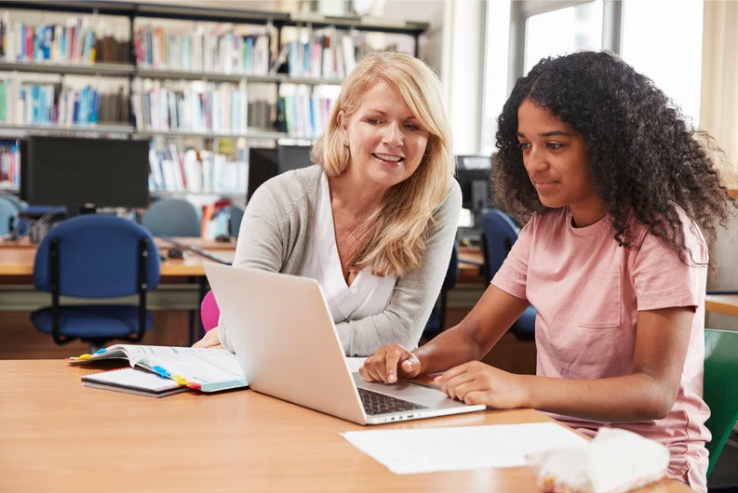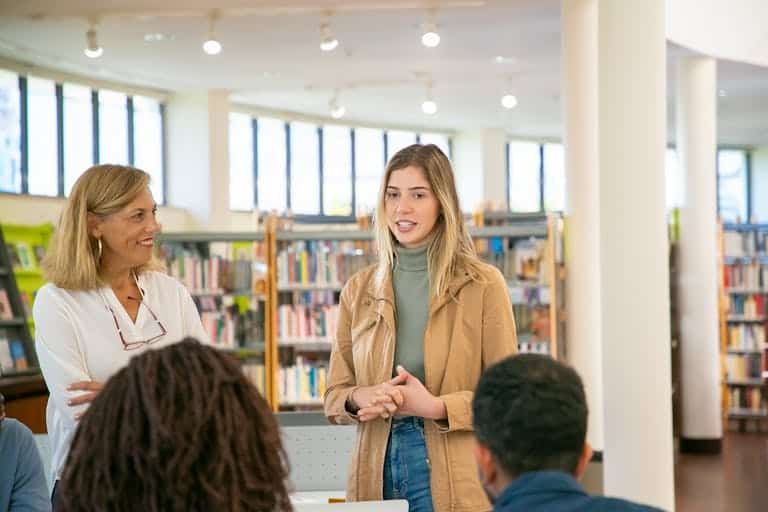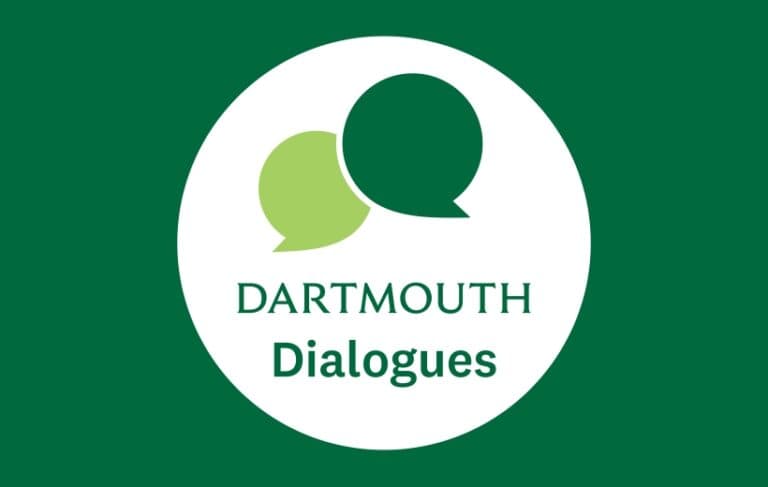R.E.A.L.® Teacher Feature: Julie Elmore & Maggie Nunn
This week, we’re featuring a team of teachers from St. Catherine’s School in Richmond, VA: Maggie Nunn, who teaches eighth grade Civics and US Government, and Julie Elmore, who teaches eighth grade English.
How do you kick off R.E.A.L.® in your classroom? What are some of the intro moves you make? What did you do last year, and have you changed for this year?
Julie: We introduce R.E.A.L.® through the English classroom, and we use it as a way to assess students’ summer reading. Typically, we use a R.E.A.L.® discussion to help students plan for a written assignment. In that regard, the kids have a bit of buy-in, because they know this discussion will help prepare them for that written piece.

That’s typically how we assess these discussions as well. Over the course of a few days, I walk them through the portfolios, which are awesome. I walk them through the R.E.A.L.® introductory slides.
One thing I did differently this year: I had a really cool video of students from last year, and I would say this was about halfway through the year where I started to see that traction really building with R.E.A.L.®. I took that clip and showed it to the girls and asked them, “What do you see that is good about this conversation? What do you notice that you can reflect on and remember from last year?” Allowing the girls to see a real conversation in the eighth grade classroom vs. what they did in the seventh grade classroom gave them ideas for how they could elevate discussion.
Did you pick up on things the 7th graders noticed as they were watching the video?
Julie: I think the biggest thing they noticed was that there wasn’t a lot of silence. They noticed that it was a very organic and true conversation, that people were ready to have something to say or ask a question. There wasn’t that awkward silence, where the conversation fizzles, which was something a lot of them had experienced the year before.
That’s really neat. How about your class, Maggie? How do you kick off the year?
Maggie: I’m fortunate that Julie does all the heavy lifting introducing this at the beginning of the year. As she said, getting buy-in from last year, and giving students the ability to see a discussion and have experience with it really allowed them to understand R.E.A.L.® a bit better.

I just had my first discussion last week, and I separated my students by birthdays. Many of them commented that they were so happy not to necessarily be with all their friends. Last year, it took a little bit longer for them to feel comfortable having a conversation with people they perhaps don’t identify as friends. This year, though, it felt like they had the tools and framework and history right away that enabled them to feel safe, to have a respectful conversation, and to understand that everyone in class would be able to contribute.
That’s huge – especially in a dynamic where you have middle schoolers who are nervous already. It’s huge for them to be able to know they’re safe.
I’m curious: what did the learning curve look like last year, for students who did not use R.E.A.L.® in the year before, and what has changed so far this year?
Julie: A big thing for our girls – which could be related to their age – is starting out with a lot of showing and telling. I.e., they want to share their quote really fast, then dive right into what they want to say. We’re trying to help them discuss in a framework that also parallels our writing structure. Instead of just presenting evidence, we want them to be able to state a claim first, then go into their evidence that supports that, followed by an explanation, which is what we would want to see in their writing. That was the biggest learning curve last year, and we’re still seeing it in some of our discussions. That’s something I really want to focus on in the coming discussions.
Maggie: I’m focused especially on trying to create an environment and structure the questions in such a way that the girls don’t necessarily feel the pressure to have a right or wrong answer. At the end of our conversation last week on enlightenment thinkers and their influence on the Articles of Confederation, I’d say about 50% of students had changed their opinion. I think that’s really important, and I know we can all relate to this. A lot of our girls want to answer the question the way they think we want to hear, but being able to give them the space and the time with each other to discuss various viewpoints, embrace uncertainty, and leave room to change their opinions is so important.
A lot of our girls want to answer the question the way they think we want to hear, but being able to give them the space and the time with each other to discuss various viewpoints, embrace uncertainty, and leave room to change their opinions is so important.
Maggie Nunn
Are there aspects of R.E.A.L.® that have helped you be able to allow the kids to change their minds and know that it’s okay to do that?
Maggie: Yes. Even just peeling back the veil for them is instructive. Sometimes kids think their teachers have everything planned perfectly, and we all can think of a time where we did a lesson plan, then perhaps there was another opportunity to do it, and it went so horribly wrong that we decided to do it totally differently the next time. Letting them know that’s the learning process for both students and teachers has been helpful. I’ve even had R.E.A.L.® discussions where I’ve modified DQs for the next class, because the original DQ didn’t lead to a deeper discussion.
How have you two planned together or reflected together?
Julie: Well, Maggie and I partner quite a bit with our curriculum, considering she teaches civics and government, so I try to align a lot of the reading that we do with what she’s teaching in her class. If one of us has an idea for a R.E.A.L.® discussion, we pick each other’s brains. We think about what kinds of readings we could pull in. Sometimes Maggie has even used whatever book I’m reading as a source that the kids can use to support whatever they’re going to respond to in her class, which has been really neat. Last year was the first time we heard the girls saying, “oh, this connects with what Ms. Nunn was saying,” or, “Oh, this connects with what we did with Ms. Elmore.” We do plan a lot together, and R.E.A.L.® really has supported that.
Maggie: Last year, we shared a unit on presidential election campaigns. They wrote about propaganda techniques after they finished reading Animal Farm. I used R.E.A.L.® at the end of that unit to have a conversation about the efficacy of various propaganda techniques. The last activity was the day before Christmas break, and they got to make their own campaign badges after having that discussion. It was kind of a nice brain break and an opportunity to do something creative, but it had already been spurred on by this more intellectual R.E.A.L.® conversation that touched on everything Julie and I had talked about in the months prior.
Did you feel like the discussion lent itself to then having that creative time be more substantial?
Maggie: It created a sense of teamwork among the girls. I heard lots of “oh my gosh, I love how yours looks,” or “I love that idea,” or “I want to draw that into mine, too.” That was because of the R.E.A.L.® framework we had laid out.
What other pieces of advice do you have for teachers, especially as they’re thinking about launching R.E.A.L.®?
Julie: When we first introduced it, we got some eyerolls and laughter when we got to the nonverbal cue section. You just have to kind of laugh with them, because it grows on them. This year, they are all about it – they really get into the hand motion to show that they agree with somebody, and they’re using it outside of the classroom, too. I think you just have to acknowledge their skepticism of some of the pieces of the program, then once they experience it for themselves, they start to realize and understand how great the structures are that you’ve put into place for them.
Maggie: Yes. And also, just know that it’s a process. After this last R.E.A.L.® discussion, I noticed a lot of students wrote in their reflections that they had really wanted to ask more questions, but they didn’t necessarily know what to ask. That gives me the feedback that they were putting a little bit of pressure on themselves and enabled me to facilitate more time in the classroom to figure out how to take notes and have a bank of solid questions before the next discussion. I know they are taking very diligent notes, but it’s helpful to give them a little bit of extra support and to remind them that each discussion should be an evolution, and they’re not all going to look the same.
How do you help students feel like they don’t have to be perfect going into a R.E.A.L.® discussion while conveying higher expectations?
Maggie: Last year there were a few times where one person didn’t necessarily prepare as well, and it really drained the group’s discussion. I’m trying to make more of an emphasis on that this year. And so many girls here play sports, so using the connection of being a good teammate is useful – they understand that if you don’t do your preparation ahead of time, it’s going to make this a harder conversation for everyone else in the group.
Julie: One thing I think works really well, particularly in an all-girls school, is that we don’t typically grade the R.E.A.L.® discussions in the traditional sense. Rather, we use them as a jumping off point to a written assignment or a more creative experience. That way, they don’t feel as much pressure to perform a certain way. Or, if the conversation goes in a different direction and they didn’t get to say what they wanted, the pressure is off. As Maggie said: R.E.A.L.® discussion is an evolution: it’s not one moment in time that is going to make or break your grade.
I know last year you looked at the data and what the student surveys looked like. How did that inform the decisions you made going forward?
Julie: The piece of data we’ve felt was the most striking was students’ sense of belonging in the classroom. When we had them do the pre-R.E.A.L.® survey, a lot of them mentioned they don’t feel like they’re heard, or they don’t get a chance to talk, or someone dominates the conversation, or they feel like the teacher doesn’t facilitate well enough. A few discussions in, that really shifted.
After a few discussions, the students felt more empowered, like they had control of the conversation and realized the teacher does not need to facilitate. Everyone is getting a chance to speak, and polite compromise really became a strength for the girls. By the end of the year, they were not only able to politely disagree with one another, but they were actually changing perspectives and ending a conversation with a totally new perspective.
Everyone is getting a chance to speak, and polite compromise really became a strength for the girls. By the end of the year, they were not only able to politely disagree with one another, but they were actually changing perspectives and ending a conversation with a totally new perspective.
Julie Elmore
Were there any breakthrough moments you had where you realized something was really coming together for a particular student in an unexpected, surprising way?
Julie: I’m thinking of a particular student, who had very strong opinions and was very academic. In one particular discussion, she listened so intently to every student, took very precise notes, took everybody’s perspective and went through it all, and then said: “I think we’ve landed here,” and came up with that new perspective. It was a lightbulb moment for the girls, and for me it was a breakthrough moment to realize I was not part of the conversation. I did not have to walk them to this answer. It was a perspective that I didn’t even come to on my own.
Maggie: For my class in general, a lot of the topics we discuss can elicit a quick emotional response, or, you know, a recitation of something that’s been heard at home or just out and about. Having R.E.A.L.® and having that ability to have a discussion that can lessen the emotional response and give more space to actually understand a nuanced perspective was so important last year, and it gave more space and depth to have those conversations.
I’m curious: where do you want to go from here? Are there plans for where you want to take R.E.A.L.® in other directions?
Maggie: Every year, I feel as though we have refined what we are doing with both our units and with R.E.A.L.®, but I think this year the goal is to have the girls leave eighth grade with such a strong foundational base of being able to analyze texts and have these conversations as we send them into high school. It was awesome to hear the Upper School English teachers say that our students were better prepared for their classes after one year. With two years of R.E.A.L.® under their belts, what a solid foundation we’ll be able to send them to ninth grade with.
Yes, and hopefully the students can feel that confidence and their new teachers can see it. Julie and Maggie, any other thoughts, questions, or advice you’d like to leave us with?
Maggie: I would just say, stick with it, even when it feels awkward. Give yourself the space and grace to feel that awkwardness with the girls and acknowledge it, and also know that it’s a good thing, because it means it’s working. You’re going somewhere, and progress is happening, but yeah, just sticking with it and being open to the fact that each discussion is going to look different – and that’s okay.
Julie: I agree. Embrace the awkward silence and the practice of being able to hold back. There are so many times I want to jump in and have done so occasionally, but it’s really better to practice holding back and letting them have the discussion on their own – because they’ll surprise you in the end.






